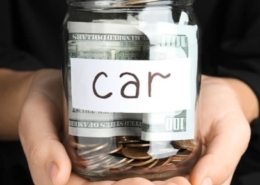The Ultimate First Time Car Buying Guide (2024 Edition)
How to Buy Your First Car and Avoid Car Buying Scams
The dream of owning your first car makes it easy to forget all the responsibilities of first-time car ownership. If you’re a teen, college student, or young adult and have never bought a vehicle, you may have a few obstacles to overcome. My first-time car buying guide will help you navigate the process.
If you haven’t already started building your credit history, you may have even more challenging obstacles to overcome.
Some car salespeople will take advantage of your inexperience. They know first-time buyers don’t know how to maneuver and navigate through the car buying process and will attempt to take you for every dime you have.
Who is a First-Time Car Buyer?
A first-time car buyer is anyone who has never financed a vehicle through a bank, credit union, dealership, or lender.
If you’ve bought a vehicle in the past by paying for it with cash, a dealer or lender will still look at you as a first-time car buyer.
Paying cash for a vehicle does not help you establish your credit history or affect your credit score.
Typical First-Time Car Buyer Mistakes
The excitement of buying your first car can be overwhelming. All the different makes and models for you to select from it’s like being a kid in a candy store.
Don’t let all the excitement cloud your judgment and make a substantial financial mistake thousands of first-time car buyers make every day. Below are a few of the most common car buying mistakes made by car buyers.
Most common first-time buyer mistakes when buying a car:
- Paying too much for the vehicle.
- Believing the dealership is there to help you.
- Purchasing a previously damaged vehicle, the wrong vehicle, or both.
- Buying a car that’s well over or stretches your budget.
- Finance the vehicle at a higher interest rate than they qualified for.
- Don’t read what they agree to.
Did You Know?
Thousands of first-time car buyers purchase vehicles every year. Many of them buy a lousy vehicle or something they cannot afford.
If you cannot pay for the car or return it, you will ruin your brand-new credit history for years.
Buying your first car should not be rushed; take your time and do your homework, and you will be sure to make a good buying decision.
Obstacles Overcome When Buying Your First Car
The last thing I want to do is to steal your dream of buying your first car. However, this is one expense you do not want to rush or let emotions take over.
However, it would be best to consider a few things before pulling the trigger. You will want to enjoy your first car and not have to stress about affording it every day for the next few years.
In my career, I’ve seen way too many young adults buy a vehicle that was way out of their price range, only to come back to the dealership later, begging us to take it back or trade them out of it. This is a bad financial situation, and my advice to you is to avoid it at all costs.
Financing your first vehicle can be very difficult; lenders see you as a risk since you’ve not yet proven yourself responsible for paying back a car loan.
Other obstacles you will have to overcome include:
- What will your fuel expenses be?
- Where will you get an auto loan?
- Budget for preventive maintenance like tire rotations and oil changes?
- Have you saved money for your down payment?
- How much car payment can you comfortably afford?
- Have you compared insurance coverage and its cost?
- Your interest rate will most likely be higher.
Understanding the Car Salesperson’s Goal
Car dealers and their salespeople are professionals. Not all salesmen are crooks; some are very honest, hard-working, and just trying to make a living. You never know who you’re going to end up dealing with.
Their job is to sell cars, and they’re very good at what they do. There’s no reason for you to get mad at them. Just keep in mind that they’ll take every dime you have if you let them. Some of the realities of the car business include:
- Sell you a car at the highest possible gross profit for the dealership.
- Attempt to upsell high-profit aftermarket items you don’t need.
- Tell you whatever you need to hear to sell you a vehicle today.
- Sell you high-profit extended warranties and other insurance products.
- Not to educate you, but to sell you something!
A dealer is not going to teach you how the car business works. Why would they, when they have a chance to make a pile of money from an inexperienced first-time buyer.
So what do you do? You’re already doing it by reading this first-time car buyer’s guide and not contacting a dealership until you’ve done your homework.
Unexpected First-Time Car Ownership Costs
There are several factors to take into account with vehicle ownership. A few unpredictable costs would be replacing tires, batteries, chipped windshields, and any unexpected mechanical breakdowns.
Again, I’m not trying to kill your dream; as long as you plan for these costs, there will be no worries.
Nobody Plans To Fail – They Fail To Plan
Let’s look at three major expenses when owning a car and average them over a month.
| Example of one month of car ownership | ||
|---|---|---|
| $393.00 | = | Average payment for a manufacturer's first time car buyer's program. |
| $464 | = | Average car insurance payment for an 18-year-old male in 2022. |
| $280 | = | $35 a tank, filling up twice a week. |
| $1,137.00 | = | Total for one month of car ownership with No additional expenses. |
To afford $1,137 a month, you must work a minimum of 91 hours at $12.50/hr, before taxes, to pay the total ownership costs for one month. A little over two 40-hour weeks will be enough to cover ownership costs, and you’ll have money left over for any unexpected expenses.
You can’t rule out preventive maintenance on your first car, such as oil changes, tune-ups, and tire rotations. Not doing these at the recommended times will shorten the life of your vehicle and may also void the extended warranty if something goes wrong. In some states, you’ll also have a few minor annual costs, such as registration, tags, and car inspections.
Planning upfront will keep you out of financial trouble when buying your first car. Take a few minutes and write down all your current or future financial responsibilities, such as rent, utilities, cellular phone, internet, etc.
Next, add your car ownership costs and stick to your budget. You may not be able to get a super expensive car the first time, but if you’re smart, you’ll be able to get the vehicle of your dreams shortly.
Step-by-Step First-Time Car Buyer’s Guide
There are pros and cons to being a first-time car buyer. Some dealerships and manufacturers have special programs to assist you in the purchase of your first car. There may also be special rates and incentives available to you if you know where to look and how to find them.
Being inexperienced can be very expensive for you. If you buy the wrong car or pay too much, you’re not getting a second chance.
There is no such thing as a “Buyer’s Remorse Return Law,” once you sign on the dotted line, you’re an owner. Even if the vehicle breaks in half when you drive it off the lot, my point is that this is not the time to “fake” your way through the car buying process; a car salesman will see right through you and eat you alive.
1) Be Honest With Yourself
Do you need a car every day to get to work or school, or just on the weekends for fun? Think about what’s important to you, economy, sporty, utility? What will you use the vehicle for?
Does it snow, rain, or is it hot where you live? Consider your way of life and the driving conditions you encounter most frequently.
Perform research and learn about various options and features and how they may impact a car’s price.
2) Make a Budget to See What You Can Comfortably Afford
I know this is the boring part about buying your first car. However, it is one of the, if not the most important, thing you can do to protect your financial well-being.
Don’t go overboard with your spending. Even though it seems very obvious, it’s still important to mention. Determine your budget so you can spend it without significantly changing your lifestyle.
Take a moment to write down all of your monthly expenses. It will help you see everything you’re paying for every month. You will be able to see what you can comfortably pay for your new vehicle once you’ve done this. This will also help you see any expense not worth what you’ve been paying, and you can cut it out.
You should consider if you will be putting any money down towards your first car. I recommend you put around 20-25% down towards the purchase.
If you don’t have that amount, at least put down the total amount of tax, title, and license fees. There’s no reason to pay additional interest on this amount.
3) Select Your First Car
Selecting your first car is fun and exciting and can also be a monumental task. You’ll want to get it right the first time because you’re most likely driving it for a few years.
What’s important to you, safety, fuel mileage, two doors, four doors, truck, SUV? There are so many different makes and models available to you that it can be hard to choose. Please don’t rush the selection process; it’s one of the most critical steps.
If you’re considering a pre-owned vehicle, read my section on how to buy a used car. It will guide you through all the steps of the used car buying process and teach you how to effectively buy a safe and reliable vehicle at the best possible price.
If you’re in the market for a new vehicle as your first car, check out my step-by-step guide on how to buy a new car.
4) Know Your Credit History
Even though you’ve never financed a vehicle before, you should still review your credit reports and know your credit score before applying for a loan. You can make sure there haven’t been any mistakes reported to your bureaus, making it even harder for you to get approved for a car loan.
The key to paying the lowest interest rates in the future is establishing a rock-solid credit foundation. I highly recommend you review your credit reports and scores frequently. You can correct any errors and misrepresentations immediately and keep yourself from becoming a victim of identity theft.
The problem with companies that give you access to your credit report for free is they do not provide you with the most crucial piece of your credit report, your credit score. Your score is what you want to know and is what lenders use to determine if they’ll extend you credit for an auto loan.
Contrary to popular belief, checking your credit will NOT harm your scores. A good credit score is your golden key to acquiring competitive interest rates for credit card offers, insurance premiums, cars, mortgages, and more. A strong score is worth money because it can save you from paying higher interest rates and excess costs.
5) Arrange Financing by Shopping Interest Rates Online
Auto finance is one of the most critical areas when buying your first car. The finance department of a dealership is where most of the fraud and deception can occur and can cause you thousands of dollars of excessive charges.
My advice is to use your down payment (the more significant, the better) and attempt to get a pre-approved auto loan by yourself first. The term “Cash is King” is used within the car business, which means two things when applying for an auto loan. Cash creates equity and provides less risk to the lender providing the auto loan.
This may prove difficult; however, when it’s time to finance your next vehicle, having a paid auto loan on your credit report, only in your name, carries a lot more weight than if you’re on an auto loan with someone else.
Use a Cosigner
If you don’t have a large amount of money saved or can’t get an auto loan on your own, the next best thing to do is to get a cosigner.
This is when you and another person are on an auto loan, and you’re both responsible for paying it back. When someone cosigns with you, you will both equally establish credit. It may not be as powerful as getting approved by yourself, but it will still help you tremendously when buying your next car.
When using a cosigner to acquire a car loan. Make sure that you familiarize yourself with the cosigner car dealer scam, so you and your cosigner are not taken advantage of by an unethical dealer.
If you have to use a cosigner, the only person I would advise you to cosign with is one of your parents. I’ve seen many cosign for their friends and co-workers, and it’s never turned out well.
Remember, if you default on the loan, you will damage your brand-new credit history, and your parents will be left responsible for the debt.
6) Compare Insurance Rates on Your First Car
It’s illegal to drive a vehicle without insurance coverage. If you get pulled over without it, you will pay a hefty fine and could have your car impounded in some areas of the country.
Auto insurance is one of the most overlooked areas when buying a vehicle, even for people who have bought several cars over their lifetime. It can be a real surprise to find out after buying your first car your monthly insurance payment is more than your car payment.
Car insurance can be costly for young drivers, especially teenagers. One factor is the age of the driver. The younger you are, the less experience you have behind the wheel.
The rate you’ll pay also depends on how new the vehicle is, the area you live in, the average miles you drive annually, and the type of vehicle you purchase. The more sporty the car, the higher the premium; the same rings true with engine size. The policy on a new car for a young driver is outrageously high.
Shop and compare coverage by getting a few free quotes online before deciding. Once you find a quote on the vehicle you’re considering, add the cost to your monthly ownership budget.
If you find insurance coverage too high, there is a cheaper route. You can ask your parents to add you to their policy. Tell them you’ll pay the difference, and whatever you do, drive carefully.
My car insurance section will help you understand secret insurance discounts, insurance myths, and where to find free online rate quotes.
7) Protect Your First Car With an Auto Warranty
I have always recommended purchasing an extended auto warranty to protect your investment, especially if you’re buying a used car. However, I do not condone paying an outrageous price for one.
As a young driver, you may not be in a financial position to pay a $3200 repair bill to replace an engine. If your vehicle breaks down from a covered repair item, the warranty company will pay for the repair, and you won’t have to come out of pocket.
Dealers have massive markups on the extended warranties they sell. The good news is that you don’t have to buy a warranty from the dealer you buy the car from. You have several alternatives, but you must be careful because some of the auto warranties out there are not worth the paper they’re written on.
Extended warranties are an optional product. It’s ultimately your decision if you want to purchase one. Never let anyone tell you that you must buy a warranty before approving you for an auto loan; this is a lie and illegal. If a dealer attempts this scam on you, kindly thank them for their time and leave.
In Conclusion
One of the biggest mistakes people make is not doing their homework before buying a new or used car. These people blindly walk into a dealership, not knowing what they’re doing, and become a victim of the dealership.
I understand the advice on this page may make buying your first car seem like a nightmare. But it’s not as scary as it sounds. Take it one step at a time.
By following my first-time car buyer’s guide and other advice on this site, you can buy your first car confidently, knowing you have a great deal. Good luck!
First Time Car Buyer’s Guide FAQs
Is it hard to buy your first car?
What is a first-time car buyer’s biggest mistake?
Three of the most common mistakes first-time car buyers make when buying a car.
- Not knowing the actual cost of vehicle ownership.
- Limiting yourself to one dealership.
- They fail to do research before contacting a dealership.
What should a first-time car buyer not say?
Not only first-time car buyers but all car buyers should not say these when buying a car from a dealership.
- “I have to have this car.”
- “My credit isn’t outstanding”
- “I’m paying cash.”
- “I need to buy a car today.”
- “I love this car.”
- “I don’t want to be ripped off.”
- “My trade-in is parked outside.”
- “I need my payments to be under $XXX.”
- “I don’t know much about cars.”
Should first-time buyers avoid dealer events?
First-time car buyers should avoid events such as dealer used car slasher sales and key mailer direct mail programs. These types of programs are used to get mass amounts of people into the dealership and are not a place for learning how to buy a car.














